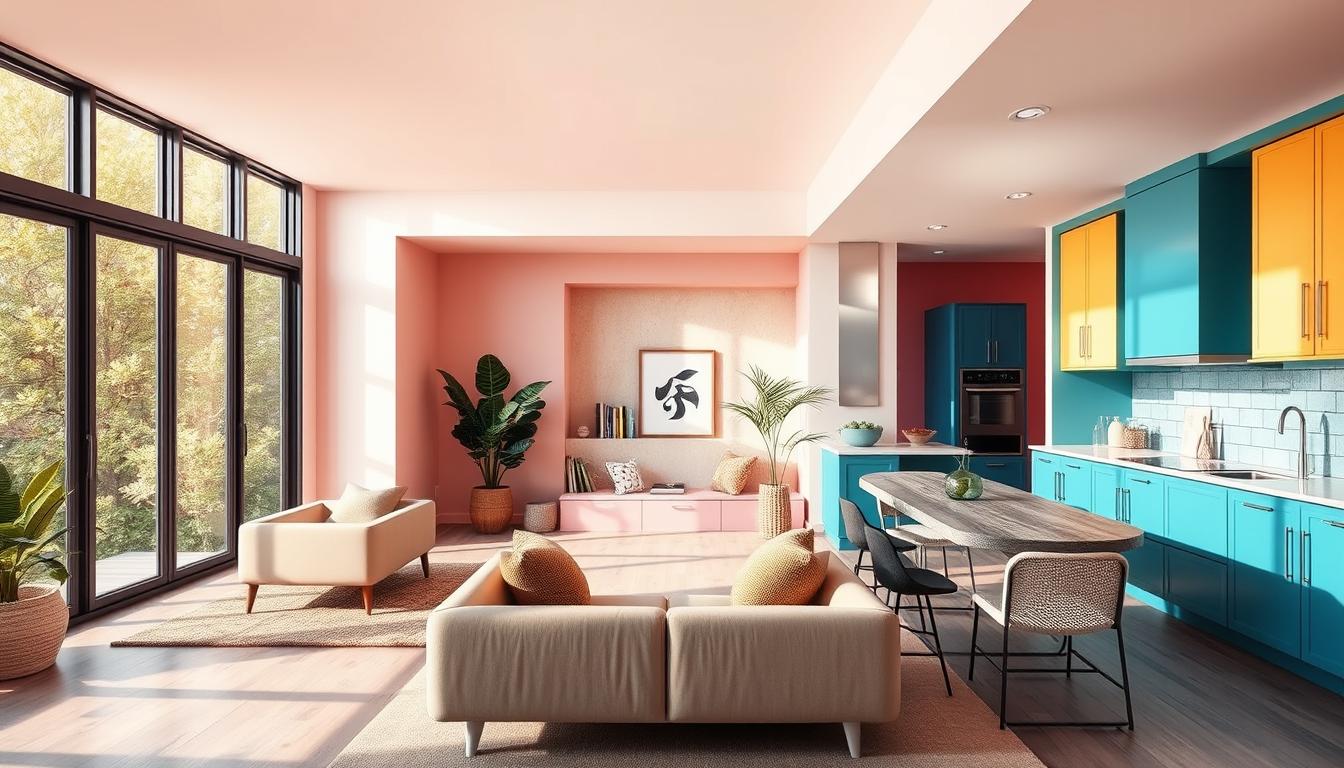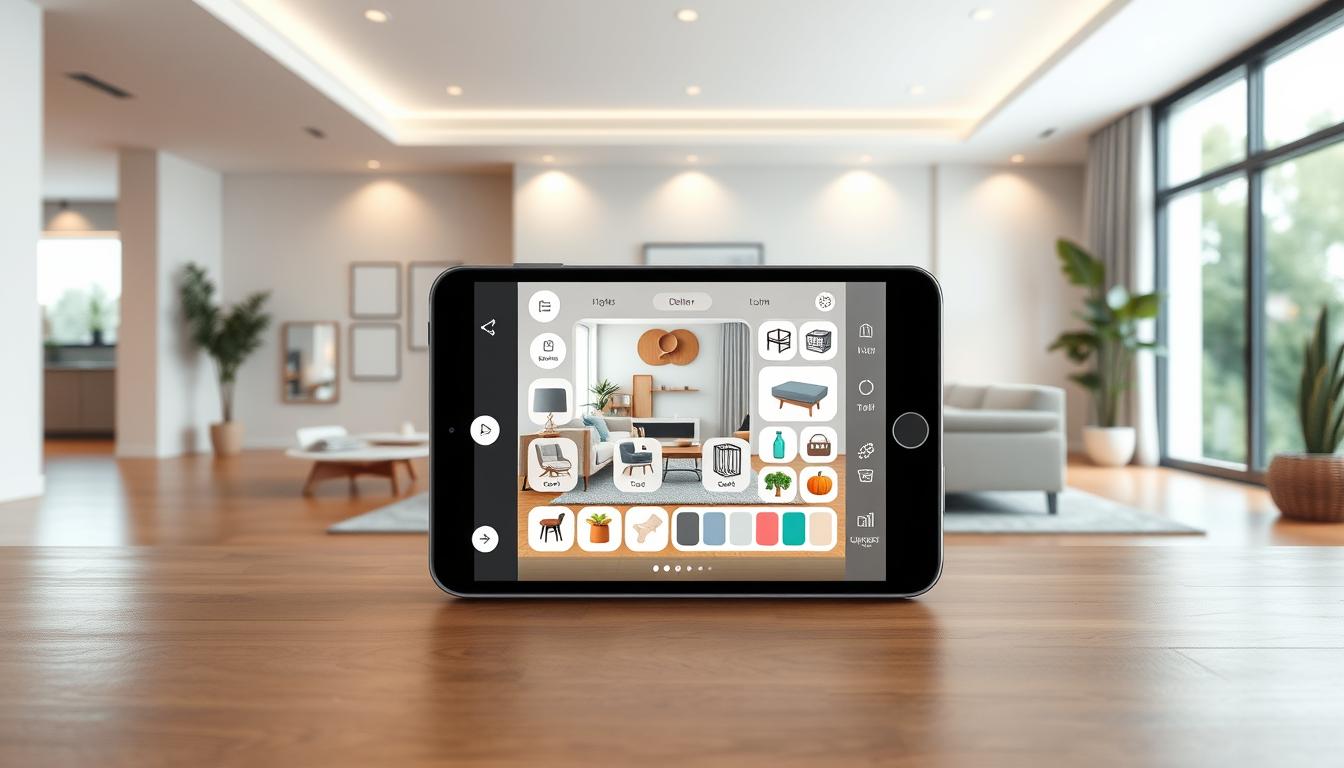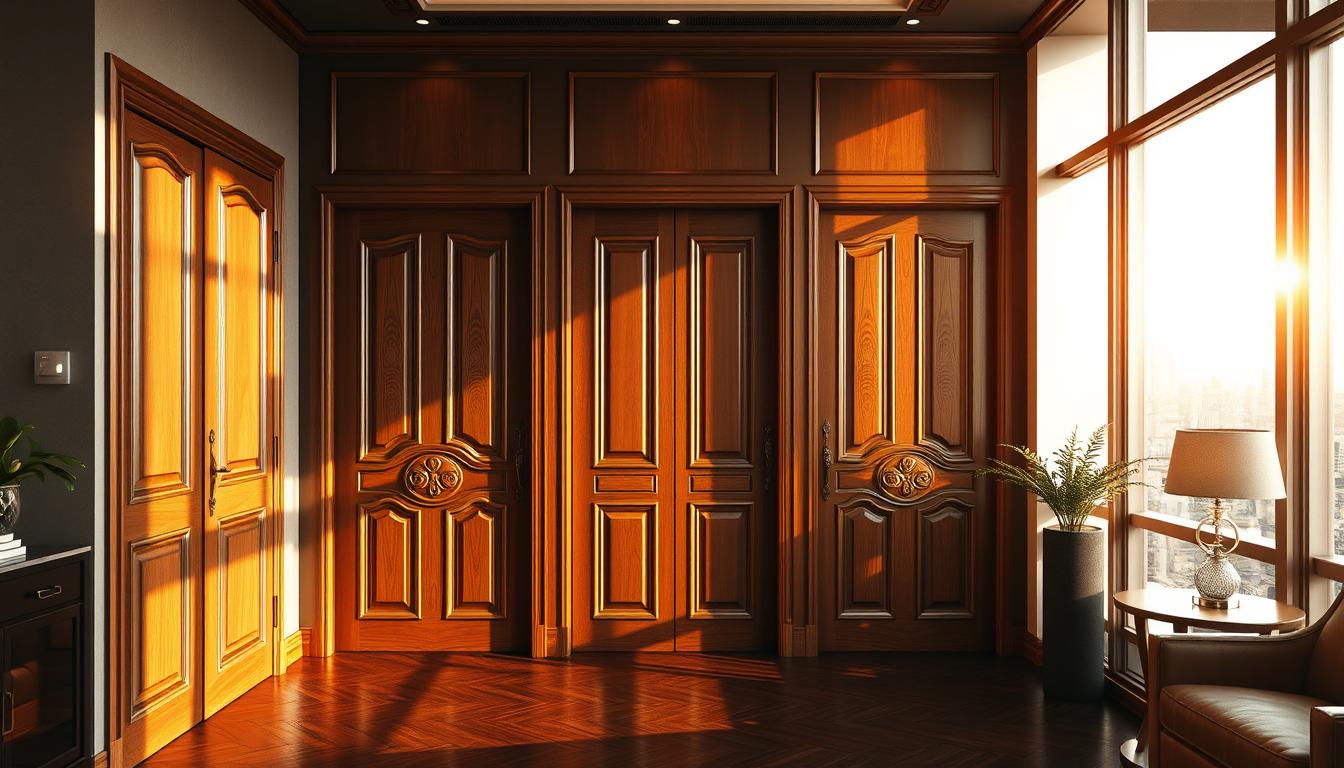A fresh coat of paint can change a room’s feel, making it seem new and lively. Did you know that a well-planned interior paint job can increase your home’s value by up to 5%? This is just one reason why interior painting is key in home decor.
We think the right interior home painting ideas can boost your style and make a space that shows your personality. With new interior paint trends coming out every season, keeping your home’s decor exciting can be tough.
Key Takeaways
- Discover the latest interior paint trends to refresh your space
- Learn how to choose the perfect color palette for your home
- Explore our top interior home painting ideas to elevate your style
- Understand the importance of interior painting in home decor
- Get tips on how to increase your home’s value with a fresh coat of paint
Understanding the Importance of Color in Interior Spaces
Color is key in interior design, affecting our mood and how we see things. The colors we pick for walls can make a room feel bigger, cozier, or more lively.
How Color Affects Mood
Different colors can make us feel different ways. For example, blue can calm us down, while red can make us feel energetic. Knowing how colors affect us is important for creating a space that makes us feel good.
Choosing the Right Color Palette
Choosing the right color palette is about more than just picking colors. You need to think about the room’s purpose, the light it gets, and the colors of your furniture and decor. A good color palette can make your space look amazing, while a bad one can make it look off.
To pick the right paint for your home, remember these tips:
- Think about how you want to feel in the room.
- Consider the light it gets, both natural and artificial.
- Try out colors with a paint sample before you decide.
Popular Color Trends
Color trends change over time, but some colors stay popular. Right now, there’s a trend towards calming and natural colors. These colors bring a sense of peace and connection to nature.
| Color Trend | Description | Best For |
|---|---|---|
| Soft Neutrals | Gentle, calming shades that work well with most decor. | Bedrooms, Living Rooms |
| Earth Tones | Rich, natural colors that evoke a sense of warmth. | Dining Rooms, Family Rooms |
| Deep Blues | Bold, dramatic shades that add depth and sophistication. | Accent Walls, Formal Spaces |
Exploring Different Painting Techniques
Transforming your home’s interior with creative wall painting techniques is fun and rewarding. By trying out various methods, you can give any room a unique touch. This makes it truly yours.
Accent Walls
Accent walls add visual interest to a room. Painting one wall in a bold, contrasting color creates a focal point. To get this look, choose a wall that naturally draws attention, like the one behind a fireplace or a large piece of furniture. Then, pick a paint color that complements the surrounding walls but makes a statement.
https://www.youtube.com/watch?v=7KATTQRtllQ
Ombre and Gradient Effects
Ombre and gradient effects bring a sophisticated, artistic touch to your walls. Ombre gradates a single color from light to dark. Gradient effects blend multiple colors. To achieve these, use a sponge or a specialized brush to blend colors seamlessly. Start with a base coat and then build up to the desired intensity.
Stenciling for Unique Designs
Stenciling lets you add intricate designs and patterns to your walls. You can create simple geometric patterns or complex murals. To start, choose a stencil that fits your design aesthetic and secure it to the wall with tape. Then, use a brush or roller to apply paint, working from the center outwards to avoid bleeding under the stencil.
By using these creative wall painting techniques in your DIY projects, you can achieve professional-looking results. Whether you want a bold accent wall or a subtle ombre effect, the right techniques can elevate your home’s interior.
The Power of Neutrals in Home Design
Neutral colors are key in interior design. They bring calm and elegance to any room. At Luxe Interior Co, we know how crucial the right neutral tones are for your home’s look.
Benefits of Neutral Colors
Neutral colors are versatile and timeless. They make rooms look bigger and stay in style longer. Popular finishes like matte, satin, and eggshell add unique touches to these colors.
| Finish Type | Description | Ideal Use |
|---|---|---|
| Matte | Flat, non-reflective finish | Ceilings, low-traffic areas |
| Satin | Slightly shiny, durable finish | Trim, doors, high-traffic areas |
| Eggshell | Soft sheen, easy to clean | Walls, living areas |
How to Add Depth and Texture
To avoid a flat look, add depth and texture. Use furniture, rugs, and decor for this. A budget-friendly idea is to paint your furniture in a neutral tone. This adds character without spending a lot.
Incorporating Bold Accents
To make a neutral room pop, add bold accents. Use throw pillows, artwork, or unique furniture. This balance creates a space that’s both harmonious and personal.
For more ideas on mixing bold accents with neutrals, check out our guide on home interior paint colors.
Making a Statement with Bold Colors
Using bold colors in your home can make a big impact. They can make your spaces more lively and interesting. Used right, they can also add a touch of class and beauty to any room.
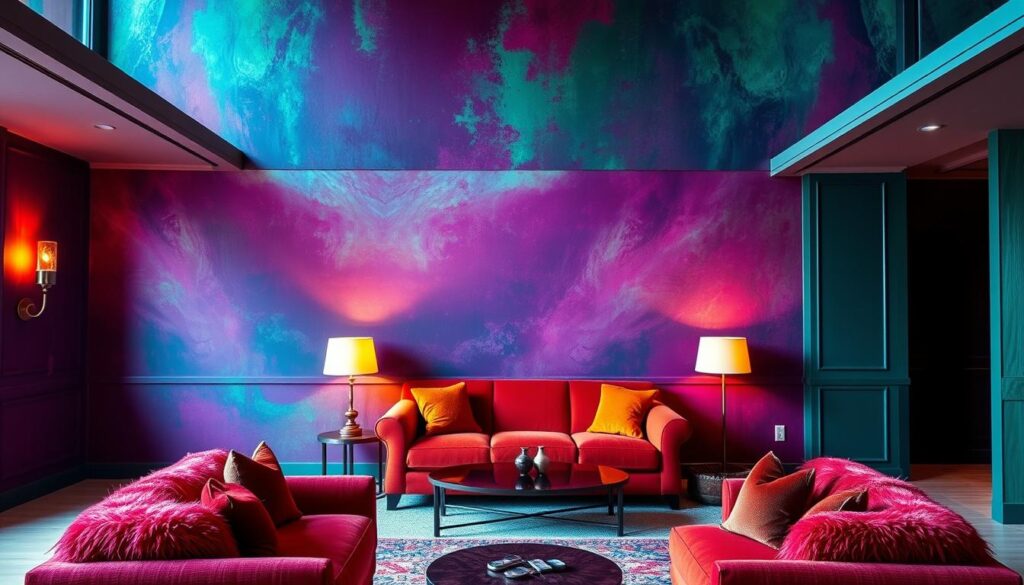
Tips for Using Bright Colors
When adding bright colors to your design, finding the right balance is key. Here are some tips to help:
- Start with a neutral base to let your bold colors shine.
- Paint one wall in bold color to make it a room focal point.
- Follow the 60-30-10 rule: 60% neutral, 30% secondary color, and 10% bold color.
For more color ideas, check out our page on top home color combinations.
Best Rooms for Bold Choices
Not every room is right for bold colors. Some spaces are better suited than others. For example:
- Kitchens and dining areas can use bold colors to spark conversation and appetite.
- Living rooms are great for a bold statement wall or furniture.
- Bedrooms can have bold colors through accent pieces or a bold wall.
Balancing Bold Hues with Subtle Accents
It’s important to balance bold colors with subtle accents. This prevents the space from feeling too much. Here’s how to do it:
- Match bold colors with neutral furniture and decor for contrast.
- Add subtle patterns and textures to add depth without overpowering the bold color.
- Bring in natural elements like wood or plants to warm and balance the space.
By carefully choosing bold colors and balancing them with subtle accents, you can create a unique and engaging space.
Adding Visual Interest with Patterns
Patterns are a great way to make your home look better. They add interest, depth, and character to any room. This makes your space more engaging and unique.
There are mainly two types of patterns: geometric and organic. Geometric patterns use shapes like triangles and circles for a modern look. Organic patterns are more natural and free-flowing, inspired by nature.
Geometric vs. Organic Patterns
Geometric patterns are great for a modern, sleek look. They can highlight a room or add interest to a wall. Organic patterns, on the other hand, bring warmth and coziness, perfect for a relaxing space.
Here are some key differences between geometric and organic patterns:
- Geometric patterns are structured and modern.
- Organic patterns are free-flowing and natural.
- Geometric patterns can create a bold statement.
- Organic patterns add warmth and coziness.
How to Utilize Patterned Paint
Using patterned paint well needs planning. First, pick a pattern that fits your room’s decor. You can use stencils or tape for geometric patterns or go free-hand for organic ones.
Here are some DIY home painting tips to use patterned paint effectively:
- Choose a color scheme that matches your room’s look.
- Apply a base coat for better paint adhesion.
- Try different techniques like layering or blending colors.
Mixing Patterns Effectively
Mixing patterns can be tricky but can add a special touch. The key is to balance them without overwhelming the senses. Start with a main pattern and add secondary ones that match it.
To mix patterns well, follow these tips:
- Use patterns with a common color for cohesion.
- Vary pattern sizes for interest.
- Keep the number of patterns low to avoid too much.
By using patterns in your design, you can follow the latest interior paint trends. This way, you can make a space that’s both stylish and personal.
Eco-Friendly Painting Ideas
Choosing eco-friendly painting ideas lets us make our homes beautiful and safe for the planet. We should focus on sustainable living in our homes. This means finding ways to reduce our impact on the environment while making our spaces better.
One easy way to make painting eco-friendly is by picking the right paint. Low-VOC and zero-VOC paints are great because they release fewer or no harmful chemicals. This makes the air inside our homes cleaner.
Low-VOC and Zero-VOC Paints
Low-VOC and zero-VOC paints cut down on harmful chemicals. They come in many colors and finishes, so we can easily find the perfect match for our homes. Look for certifications like Greenguard Gold or California Air Resources Board (CARB) Compliant when shopping.
Some top brands for these paints include:
- Benjamin Moore’s Natura
- Behr’s Premium Plus ULTRA
- Sherwin-Williams’ ProMar 200 Zero VOC
Sustainable Painting Practices
It’s not just about the paint. How we prepare and paint also matters. Here are some tips:
- Make sure surfaces are ready to paint to avoid waste and get a smooth finish.
- Use drop cloths or tarps to protect floors and furniture.
- Wash brushes and rollers with soap and water, not harsh chemicals.
By following these tips, we can greatly reduce the harm our painting projects cause to the environment.
Upcycling Furniture with Paint
Painting old furniture is a creative way to give it new life. It’s a great way to reduce waste and add a unique touch to our homes.
When painting furniture, use eco-friendly paints and techniques. Try a chalk paint finish for a vintage look or a distressed finish for a rustic feel.
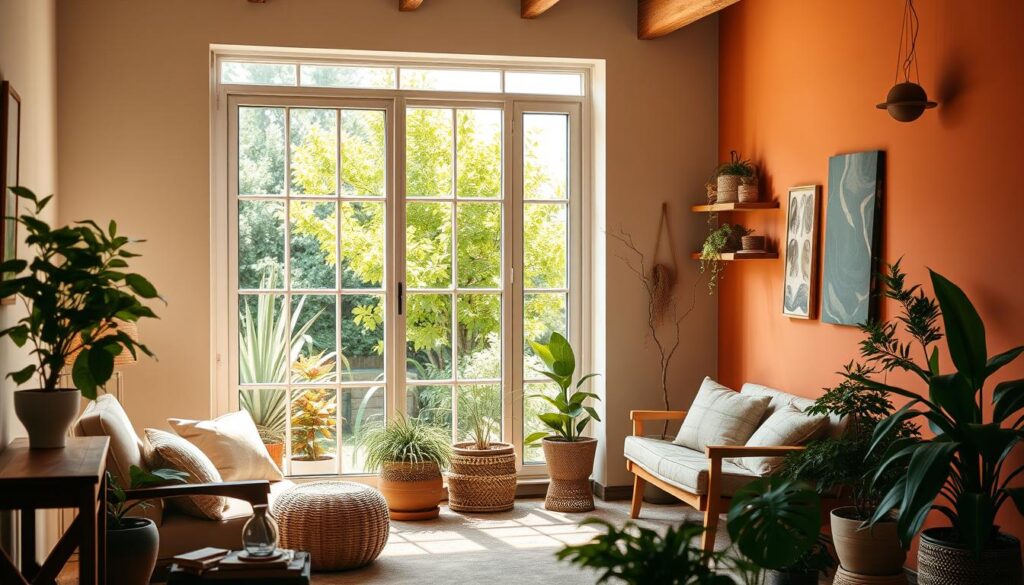
| Feature | Traditional Paint | Eco-Friendly Paint |
|---|---|---|
| VOC Emissions | High | Low to Zero |
| Environmental Impact | Higher | Lower |
| Indoor Air Quality | Can be harmful | Improves air quality |
As we strive for sustainable living, using eco-friendly painting ideas is a big step. By picking low-VOC paints, following sustainable practices, and upcycling furniture, we can make our homes beautiful and safe for the planet.
“The most important thing in design is to create a space that feels like home, and with eco-friendly painting ideas, we can achieve just that while being kind to the environment.”
The Impact of Lighting on Paint Colors
Lighting can change how paint colors look in your home. The color’s appearance under different lights can greatly affect a room’s look.
Natural vs. Artificial Lighting
Natural and artificial lighting have different effects on paint colors. Natural light changes with the day, affecting color appearance. On the other hand, artificial lighting shows colors in a consistent, but possibly different, way.
When picking paint colors, it’s key to see how they look under both natural and artificial light. This helps make a better choice.
Color Changes Throughout the Day
Colors can look different at different times due to natural light changes. For example, a color might seem bright in the morning but softer at night. Knowing these changes is important for choosing a color that looks good all day.
- Morning light: Often harsh and bright, which can accentuate cooler tones.
- Afternoon light: Softer and warmer, which can bring out warmer tones.
- Evening light: Typically warmer and more golden, which can add a cozy feel to a room.
Choosing the Right Finish
The paint finish is as important as the color. Different finishes change how colors appear and how long the paint lasts. Popular finishes include flat, eggshell, satin, and semi-gloss, each with its own use.
| Finish | Characteristics | Best Use |
|---|---|---|
| Flat | Non-reflective, hides imperfections | Ceilings, low-traffic areas |
| Eggshell | Slight sheen, durable | Living rooms, bedrooms |
| Satin | Soft sheen, easy to clean | Kitchens, bathrooms |
| Semi-gloss | High sheen, very durable | Trim, doors, high-traffic areas |
By thinking about your home’s lighting and picking the right finish, you can get the look you want. And make sure your paint job lasts.
Preparing Your Space for Painting
To get a professional paint job, you must prepare well. Before painting, make sure your space is ready. This ensures a smooth and successful project.
Essential Tools and Materials
Having the right tools and materials is crucial for painting your home. Here’s what you’ll need:
- Paint (choose the right type for your surface)
- Paintbrushes and rollers
- Paint tray
- Drop cloths or tarps
- Sandpaper or a sanding block
- Primer (if necessary)
- Masking tape
- Cleaning supplies
When picking paint, think about color, finish, and durability. For tips on how to choose the right paint for your home, consider the room’s purpose and light.
Steps for Proper Surface Preparation
Proper surface preparation is key for a great paint job. Follow these steps:
- Clean the surface to remove dirt, grime, and grease.
- Fix any holes or cracks with spackling compound.
- Sand the surface to create a smooth finish.
- Wipe down the surface with a damp cloth to remove dust.
- Apply primer if you’re using a dark color or covering a light color.
| Surface Type | Preparation Steps |
|---|---|
| Drywall | Clean, spackle holes, sand |
| Wood | Clean, sand, fill gaps if necessary |
| Previously Painted | Clean, lightly sand, prime if necessary |
Safety Precautions
Always prioritize safety when painting. Here are some key safety precautions:
- Wear protective gear like gloves, goggles, and a mask.
- Ensure good ventilation by opening windows and using fans.
- Use drop cloths to protect floors and furniture.
- Keep paint and cleaning supplies out of reach of children and pets.
- Follow the manufacturer’s instructions for paint and other products.
By following these guidelines and taking the necessary precautions, you’ll be well on your way to a successful DIY home painting project. Remember, preparation is key to achieving a professional-looking finish.
Innovative Finishing Techniques
Interior design is changing fast, thanks to new painting techniques. These methods make our homes look better and show off our style.
Textured Finishes
Textured finishes bring depth and interest to any room. Using Venetian plaster or texture paste, you can make walls feel special. “Texture changes a room’s feel,” says Jane Smith. “It adds character without being too much.”
To do this, you apply a textured compound to the walls. Then, paint over it for a smooth look. It’s great for covering up wall flaws.
Metallic and Pearlized Paints
Metallic and pearlized paints add luxury to any room. They shine and make spaces feel fancy.
These paints come in many colors, from soft to bold. Metallic paints have a bright shine, while pearlized paints are softer and calming.
“Metallic and pearlized paints turn a room into a stunning sight. It’s all about light and shadow for a lively space.”
The Appeal of Chalk Paint
Chalk paint is loved for its simplicity and flexibility. It sticks well to surfaces without primer, perfect for DIY fans. You can get a vintage look or a smooth finish with it.
Chalk paint is great for making things look old or new. It’s also perfect for fixing up old furniture, giving it a fresh start.
Exploring new painting techniques opens up endless possibilities. Whether you want texture, luxury, or a vintage vibe, there’s a method for you.
Enhancing Specific Rooms with Color
Choosing the right colors for painting your home is key to making it welcoming. The colors you pick can greatly change how different rooms feel. They can make your home feel more inviting and useful.
Kitchen and Dining Room Ideas
The kitchen and dining areas are the heart of your home. So, picking the right color is very important. For kitchens, warm colors like beige or soft yellow can make the space feel cozy and inviting. Dining rooms look great with richer tones like deep reds or burgundies, perfect for dinner parties.
| Room | Recommended Colors | Effect |
|---|---|---|
| Kitchen | Soft Yellow, Beige | Inviting, Cozy |
| Dining Room | Deep Red, Burgundy | Sophisticated, Elegant |
Bedroom Sanctuary Inspirations
Bedrooms should be places of peace and rest. Soft colors like light blues or pale greens help you relax and sleep better. You can also use budget-friendly ideas like accent walls to add interest without spending a lot.
Creating a Cozy Living Room
The living room is where we spend time with loved ones. Warm colors like taupe or sienna can make it feel cozy. You can also use bold colors as accents to add energy and fun.
By choosing colors wisely for each room, you can make your home look and feel better. You can create beautiful spaces that are also easy on your wallet.
Maintaining Your Painted Surfaces
To keep your home looking its best, maintaining your painted surfaces is crucial. A well-maintained paint job not only enhances the aesthetic appeal of your space but also prolongs the lifespan of the paint.
Long-Lasting Finish
For a long-lasting finish, it’s essential to choose popular interior paint finishes that suit your lifestyle. For instance, satin or eggshell finishes are ideal for high-traffic areas due to their durability and ease of cleaning. Following DIY home painting tips, such as applying a primer and using high-quality paint, can also make a significant difference.
Touch-Up and Cleaning
Regular touch-ups and cleaning are vital to maintaining your painted walls. For touch-ups, use the same paint batch to ensure a seamless blend. When cleaning, avoid harsh chemicals and abrasive materials; instead, opt for mild soap and water to gently wipe down the walls.
By following these simple maintenance tips, you can enjoy a fresh and vibrant home for years to come.

